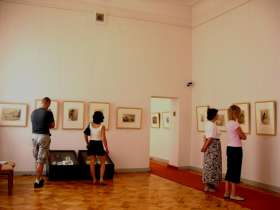Kubin in Vilnius, New Womens Power, 14,000-Voice Chorus July 20, 2007

As one of over 40 events on the programme of the Night of European Culture (June 22-23) initiated by Vilnius 2009, the Kubin exhibition remained open until 1 AM for a late-night “Kubin Reading with Piano Music” featuring actress Jūratė Vilūnaitė reading selected chapters from Kubin’s novel “The Other Side” that had been translated into Lithuanian expressly for this occasion. “Let There Be Night!” was the maxim, and more than 120,000 culture enthusiasts answered the call. The nocturnal lineup included the installation “Green Fluxus Bridge,” heathen-style fires along the Neris River, silent prayer in the Church of St. Bernard, open-air cinema, improvisational theater, and dance beneath the stars.
High-powered, successful career women take the helm at Vilnius 2009: Elona Bajorinienė, who had previously held the post of programme director and has been interim CEO since May, was officially appointed director of Vilnius 2009 in mid-July. Elona Bajorinienė worked for over a decade in the field of cultural journalism, and served for many years as cultural advisor to many different government institutions. Since 1997, she has also made quite a name for herself in the field of international cultural management. She now heads a 19-person staff that will grow to 35 by 2009. Dalia Bankauskaitė, who has been the new executive director since early July, has extensive experience in the communications and marketing fields both in Lithuania and abroad. Both positions had to be refilled after the two women who had previously held them left office at the end of May.
By the way: A 14,000-voice chorus resounded at the grand concert event that concluded the 17th Lithuanian Song and Dance Festival recently held in Vilnius’ Vingis Park. Lithuania’s best amateur singers—most of them under the age of 20—covered a stylistic spectrum that ranged from the multi-voice polyphonies of traditional Lithuanian sutartinės to folk songs updated with jazz and rock elements. The Lithuanian Song and Dance Festival is normally held every four years, but the next one is set for 2009 to coincide with Lithuania’s millennium celebration and the capital of culture year. In 2003, UNESCO proclaimed "The Baltic Song and Dance Celebrations" (Multinational masterpiece: Lithuania - Estonia - Latvia) as "Masterpieces of the Oral and Intangible Heritage of Humanity."
(Translation commissioned by Linz09)








